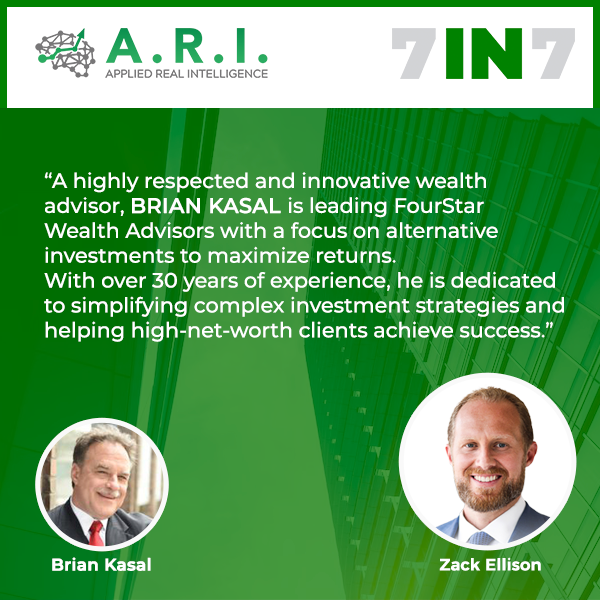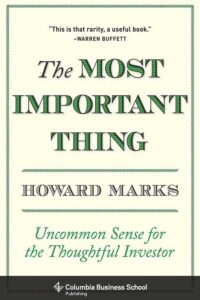
 |
 |
 |
|---|
Watch the episode here
Listen to the podcast here
Welcome to the first episode of the 7in7 Podcast with your host, Zack Ellison.
In this episode, we’re joined by Brian Kasal, CEO and founder of FourStar Wealth Advisors and a fellow Chicago Booth MBA grad. Brian shares his insights as one of the best investors in the country, discussing alternative investments, market trends, and the importance of diversification.
In this episode Zack and Brian discuss:
- Minimizing Losses During A Market Panic
- The Growth Potential of Venture Debt Investments
- Essential Reading for a Strong Foundation in Investing
- Preparing for opportunities in the crisis
Why Cash Is King: How To Capitalize On Investment Opportunities With Brian Kasal, Founder & CEO, FourStar Wealth
Welcome to the 7in7 show. I’m your host, Zack Ellison. This show is meant to bring the world’s leading investors and their investment advice to a broader audience. We’re here with Brian Kasal, CEO and Founder of Fourstar Wealth, a leading wealth advisor based in Chicago. Brian, please introduce yourself and tell us a little bit about you.
Thanks, Zack. I’m glad to be here. Thanks for having me on your show. I am the CEO and Founder of a firm called FourStar Wealth Advisors in Chicago. We founded FourStar in 2014. After my 30 years in the industry prior, with firms like PaineWebber, some of the old timers might remember that Lehman Brothers, a firm in Chicago called William Blair, and then I did a stint at Morgan Stanley. My objective in founding FourStar was part of the change in the industry where there’s a shift into the investment advisor world from the broker world. We’re part of that whole trend, but we have advisors all over the country. We’re 35 advisors now in 13 states, and we’re growing nicely working with high-net-worth families all across the country and some overseas as well.
Brian, you’re one of the fastest-growing wealth managers in the country. I think part of that is because you’re very innovative in how you think about investing. What are you working on right now?
Alternative Investing And Feeder Fund
We’re working on a couple of things that I think are important. Right now, we have been doing alternative investing, which is not stocks and bonds. It’s private partnerships, whether it be real estate or business services, corporate debt, and various things where you can get a better return. Then the public markets, if the stock market averages a 10% return over time, and then the bond market averages maybe 3% or 4%, the alternative world in the proper allocation can earn 15%-plus. If you add alternatives to your portfolio, it really can be augmented and very positive.
Where are pre-earning and alternatives fun? One of the issues with alternatives is every time you invest in a private partnership, you have to do a lot of paperwork. A lot of people get sick of the paperwork. You also get a lot of tax forms and K1s, and you have a two-inch tax return. By creating a feeder fund, people can invest in that fund and only get one K1 and one document that they have diversification within it. We’re trying to simplify, press the easy button on the alternative investing world. That’s something we’re working on right now. That’s an important thing. That’ll be offered as early as next week.

That’s very exciting. One of the themes I’ve been seeing a lot in the RIA segment is this move to try to get into alternatives because of the many benefits. What I’ve found is a lot of wealth advisors have been very slow to move, and they continue to really base their entire portfolio around the 60/40 allocation of stocks and bonds with little tweaks on the margin. They’ve really missed out on a lot of the opportunities and private credit and real estate, private equity, and venture capital over the last couple of decades. What is it that led you to want to do this? Was it demand-driven from your clients? What inspired you to build this out?
I’ve done a lot of alternative investing, Zack, through my career with my wife and I buying lots of different real estate markets and then different partnerships. That’s always been available to investors in some way, but now there’s a lot more emphasis on alternatives. After a bad year like last year, the alternatives did very, very well. The bond market was the worst bond market in American history.
The stock market was one of the worst, not the worst, but one of the worst as well. People are looking for other alternatives to get a better return. We have focused on that to the point that we’re trying to make it simpler for investors to do that. Plus, there are a lot of qualifications that you have to have to be part of it. There’s some complexity that a lot of investors don’t understand that well. We’re trying to make it simple. That’s why we’re doing it.
That makes sense. You’re definitely one of the leaders in the space. I think others are going to eventually follow up, but it could be a while. What’s something that you’re thinking about right now that you think is important that others might be missing?
I’m switching to the public markets. We’re in a really rough time right now. Markets were higher at the beginning of the year. Now they’re coming back to the flat and everyone’s getting concerned. We’re seeing a big banking crisis right now. We’ve seen a couple of big banks go into receivership and then the government took them over. Interest rates rising is causing problems for the banks. I think anybody who’s really watching long-term always knew this might happen.
Current Market Crisis And Opportunities
Then the markets are reacting negatively to that. What we’re watching, Zack now is the opportunity that this kind of environment creates because every crisis leads to an opportunity. We raise a lot of cash in bad markets and we rotate out of the market partially or in some portfolios completely and we’re three-quarters of the way there already. We’re pretty defensive right now. Rather than looking at how bad it is, what we’re looking at is saying, first of all, are we going to go to maximum cash and when would we do that?
Every crisis leads to an opportunity. Share on XEither way, whether we’re bottoming now or we bottom later on, there will be great opportunities and how are we going to take advantage? That’s what we’re focused on. We’re not focused on the problem. We’re focused on the opportunity because it will be there. It’ll be really clear to people who are watching, but most people won’t be as they’ll be in a panic about what just happened and they’ll forget what the opportunities are.
The best opportunities happen because risks have just occurred. I always think it’s ironic that people pull back and get very scared after the risks have already been realized. If you look back to 2010 coming out of the credit crisis, banks and many investors sat on the sidelines, and that was the best opportunity to get to the market. I think we’re going to see a similar opportunity coming up after this banking crisis. It’ll get resolved one way or another. Ultimately, that’s when you want to be sitting on a lot of cash like you said, so you can deploy it into the most opportunistic, interesting investments that others will miss because timing is so important. I totally agree with you. Cash is king, and having dry powder when there are ample opportunities is ultimately going to leave out performance.
Zack, looking back to March of 2009 when the markets bottomed after the Great Recession, most people were in a panic right around then. The recession continued for two more quarters, but the markets tend to bottom before the recession is done, usually 6 to 12 months before the recession is done. That was a great opportunity. Everyone knows that now, but during that time, most people were not focused on that at all. I will make the argument again that just like then, when the markets finally bottom again, whether they’ve already bottomed in October or they bottomed lower, most people will be focused on how bad things are, and they’re nervous and they should be looking at the opportunity.
I feel like people miss this all the time because of some psychological heuristics or biases where they’re scared and they miss the opportunity. That’s why it’s good to have a trusted advisor who can help you along because sometimes you need somebody to rely on that’s thinking objectively when you might not. With that, you’ve been in the market for almost 40 years now, which is incredible. I wanted to ask you about some of your timeless investment principles if you’ve got things you’ve learned over the years that work for you and should work for everybody. I’d like to hear from us.
Timeless Investment Principles
I would say investors should take risks when risk is being rewarded. Eighty-five percent of the time, the markets are usually moving up. They squiggle back and forth but generally move up. About 15% of the time, the markets are either in correction or outright panic. The most important time is that panic time. In the markets, when they’re moving up, everybody makes money, everybody’s happy, it’s a wonderful environment. The most important thing is to have a plan when the markets are going down and try to minimize your loss.
If you’re down 10%, maybe you can recover and you can minimize your loss to that. You’re down 20% the next couple of years you can recover but if you’re down 30%, Zack, 40%, let’s say 50%, if you’re down 50%, you’re going to have to double your money to break even from where you started. That will take you an entire decade. The most important thing is to have a mechanism to avoid major loss. Everybody will lose a little bit of money in a bad market. The key is how do you minimize it, then how do you get ready for the next opportunity? That’s really an important principle.
Everybody will lose a little bit of money in a bad market. The key is how you minimize it so that you are ready for the next opportunity. Share on XThe other principle, of course, is to diversify very well. We’ve heard a lot of people talk about investing in Bitcoin and different very speculative investments. Those who do that with a very small amount of their capital can survive if it doesn’t work out. That’s why people don’t buy one stock, they buy 25 or 30 stocks. They should do the same thing with bonds, they should do the same thing with alternatives and diversify because mistakes will be made. No one is perfect. The idea is to minimize that damage and that’s your diversification. That’s your only savior, your only hope. Obi-Wan, that’s my only hope.
Diversification and protecting the downside and really thinking about risk first, and I was a fixed-income investor pretty much my entire career. We’re always trained to think about the downside because the upside is relatively certain and known unlike stocks where you’ve got a lot more upside, but you also have a lot more downside, but I think in a market like this, thinking about risk first is the way to go ultimately and staying diversified to your point. What that means to me is not just diversifying across stocks and bonds, but diversifying into other asset classes like you’re doing for your clients with alternatives. Are there any alternatives that you like in particular for this part of the cycle?
There are a lot of corporate credit programs that are out there where instead of getting the small return that your bank will offer you, you can get a little bit more interest rate on the money that you have invested. They’re considered to be debt programs, and that’s essentially what a bond is. It’s government debt or a corporate bond. That’s also a debt security. Rather than growing, you’re getting interest for putting the money in. It’s a really interesting debt program out there right now.
Some need to be careful of, and you need a good advisor to help you walk through that because we’re having some credit issues with some of the banks. The offerings that you had been offering, Zack, the venture debt program is very interesting because venture capital is known as an area of growth and an area of more risk perhaps than the stock market. Usually, you’ve only been able to invest in the venture as an equity investor.
Evaluating Private Partnerships
Now your group is trying to help folks invest in the debt side of the venture. Venture capital companies do take on debt rather than just equity investors as well. They usually pay some pretty nice coupons and there’s some good opportunity there. That’s one thing that we’re looking at right now. Alternatives in general, I think are a pretty good investment here because the horizon is long-term. I think over that cycle, even if we’re having a bad year now, we’ll have a good cycle over the next 5 to 7 years. Those are good investments to consider.

Why Cash is King: Alternatives, in general, are a pretty good investment because the horizon is long-term.
Cycling, but building up what we were just talking about, are there resources that you’ve come across like books, for instance, that you think every investor should read?
I’m going to offer two ideas that would be really good if you really want to learn about the investing world and start to do some of it on your own or just be more knowledgeable when you’re working with your advisor. To learn about the markets in general, there’s an old book written in the 1920s called Reminiscences of a Stock Operator. It’s about a trader who was working in the bear market rates of the 1920s. It talks about how you can tell the market’s strong and how the market’s weak. Very often we will turn on TV like CNBC’s act and the market’s up, down, up big or down, down big.
They tell all these stories as to why, but it really isn’t clear. You don’t really understand it. When people throw up their hands and say, “I cannot make any sense of this, this is crazy stuff.” It’s really not. There are patterns that markets follow. A reminiscence of the stock operator will help you understand how markets move when markets are strong, and how you can tell a weak market. How can you protect yourself? Then when things are good, you can take advantage of a good strong market. That’s one idea. The other one is just a general overall view.
It’s written by a gentleman by the name of James O’Shaughnessy. It’s called What Works on Wall Street. It’s a description of all the different styles of investing. If you invest in stocks for dividends, high earnings growth, book value, or all the other possible metrics that you might invest in. What are the common themes that all those investing themes have? You may like a certain way of investing, but it doesn’t work in certain periods of time. What are all the positive characteristics that are common to all of those themes? That’s what this book covers.
A lot of that relates to relative strength. If you’re going to beat a benchmark, like the S&P 500, you cannot index just like the market, you’ll do no worse or no better than the market. How do you divert from that? How do you beat a benchmark where you have to diverge from it? The question is, how do you do that? That book will help you figure out some of those ideas. We can help you too, but if you want to read up on it, that would be a good book to understand.
Those are both great books. Earlier in my career, I was a bond trader, as you know, and there are very few books written on trading that are good. I read that book, Reminiscences of a Stock Operator and it really helped me a lot just in terms of understanding risk sentiment and the psychology of markets as well. Another book I liked a lot, another Chicago Luthgrad, Howard Marks wrote a book called The Most Important Thing, which I think is a great read in terms of learning about the various risks that investors face.
It’s written in a way that you don’t have to be a trained investor to understand it and puts it in terms that are understandable. That’s another one of my favorites as well. I want to ask you if, with all the stuff that’s going on in the banking market right now and all the dislocation, there are a lot of people moving money around. A lot of people taking money out of one bank and putting it into another, but I think a lot of people are also switching wealth advisors as well, mainly because last year’s performance was pretty bad in stocks and bonds and the average client was in a 60-40 portfolio, it was probably down about 20%.
Then this year, things started off okay, but now we’re heading into this uncertainty with interest rates and inflation and banking. We’re seeing a lot of dislocation, a lot of movement. If a client were to come to you, let’s say they were a client at one of these institutions that is not doing so well and they said, “We would really like some trusted financial advice. They came to you with a big chunk of money and they didn’t really have any investment knowledge. What would you say to them and how would you think about planning?
The Importance Of A Long-Term Perspective
That situation happens actually fairly regularly where we have people come to us and say, “I just sold a company or I got an inheritance or something like that.” I think the most important thing is to either find a trusted advisor or learn by yourself about how to invest, although a large sum of money you probably should get an advisor because they have experience. The common theme is when people get a large chunk of money though go buy a car, they’ll celebrate, and they do things. That’s fine I guess, and in very, very small doses.
Probably the most important thing to do right away is nothing. Leave that money right where it is, work with an advisor to make a plan for what that money can do for you for the rest of your life and not just this month or this summer. If you don’t have a plan, if you have a financial plan, then you can add those dollars into your financial plan. If you don’t have a plan, it’s important to sit down and figure out what this money is going to do for you. Then what do we have to invest it in to get that return that we need to accomplish that?
That’s really a much broader discussion than, “What stock are we going to buy? Or do we buy this house or that house?” It’s a much broader discussion. If you have an overall plan, then you’ll not fall for the latest fad that’ll come by and say, “Let’s put money here. Let’s put money there.” Everybody will have an idea. Every friend you’ve ever had will probably have their aunt out. It’s important that you have a plan and what will work in your plan. Then you can go forward and confidently invest if you have a plan.
It's important that you have a plan and know what will work in it. Then, you can confidently go forward and invest. Share on XThis has been super helpful. We’re running out of time. What would you like to leave the audience with if there was a part of your thoughts?
Managing Risk In Uncertain Times
I would say this is a very stressful environment that investors are in right now. I think the most important thing is that investors step back from this, and never make very emotional decisions. As I mentioned earlier, have a financial plan that will script out what your life looks like. You integrate social security, you integrate all the other aspects of your life into your plan and then follow that plan. Bear markets like this still go on forever. There’s never been a thing, Zack, is a perpetual bear market. If we know it’s going to end, we have to prepare for the end, and that’s where the opportunities are. Have an overall plan, and if you really don’t know what you’re doing, or you’re new to it, do work with a good advisor.
What’s the best way for people to reach you?
We have a website, FourStarWealth.com, and you can reach us through there. You can sign on through the website, or you can just call our headquarters office in Chicago. It’s 312-667-1750 is our main line. You can ask for me, I’m Brian Kasal. I’m the Founder and CEO of the firm. If you want to talk about investing, we’re happy to set you up with an advisor and get things rolling. Then also, if you want to learn more about FourStar, we have a podcast series called Today’s Market Explained.
You’ve been a guest on that show, Zack. It’s available on Apple, iTunes, Stitcher, Spotify and there are videos all over LinkedIn, Instagram, and Facebook as well. Little video clips of all the things that we’re talking about. If you want to learn a little bit more about FourStar and the things that we’re saying, we’re very well exposed out there. If you haven’t seen us, you’ve been living under a rock.
Brian, I love your podcast of it. You’ve done probably more than 160 episodes at this point, or maybe even more than that. They’re very helpful. I think I was on episode 153 Talking About Adventure Debt. That’s my favorite, of course, but they’re all good. I learned a lot from them. I’m definitely worth watching. Brian, thanks so much for coming. I learned a lot. I’m sure other people did as well and everybody listening, we’ll see you next time on 7in7.
Important Links
- Zack Ellison on LinkedIn
- Applied Real Intelligence (A.R.I.)
- 7 in 7 Show with Zack Ellison on Apple
- 7 in 7 Show with Zack Ellison on Spotify
- 7 in 7 Show with Zack Ellison on YouTube
- 7 in 7 Show with Zack Ellison on Amazon Music
- Brian Kasal on LinkedIn
- FourStar Wealth Wealth Advisors
- Reminiscences of a Stock Operator
- What Works on Wall Street
- The Most Important Thing
- Today’s Market Explained
- Today’s Market Explained on Apple
- Today’s Market Explained on Spotify
- Zack Ellison on Today’s Market Explained Episode
- Financial Advisor’s Workshop
- 7 in 7 Show Disclaimer
About Brian Kasal
 Brian Kasal is the CEO and founder of FourStar Wealth Advisors LLC, an SEC Registered Investment Adviser firm headquartered in Chicago. Brian holds an MBA from the University of Chicago’s Booth School of Business and has been a guest lecturer for their MBA program.
Brian Kasal is the CEO and founder of FourStar Wealth Advisors LLC, an SEC Registered Investment Adviser firm headquartered in Chicago. Brian holds an MBA from the University of Chicago’s Booth School of Business and has been a guest lecturer for their MBA program.
